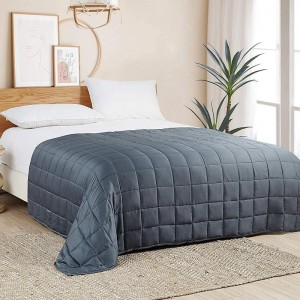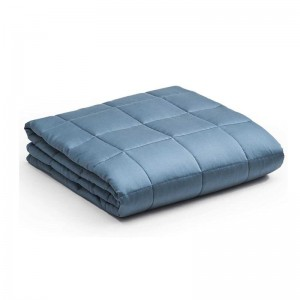Here at KUANGS, we make several weighted products aimed at helping you relax your body and mind — from our best-selling Weighted Blanket to our top-rated shoulder wrap and weighted lap pad. One of our most frequently asked questions is, “Can you sleep with a weighted blanket?” The short answer is yes. It’s not just acceptable to sleep with a weighted blanket — it’s also encouraged!
Research shows that sleeping on a weighted blanket can greatly optimize the quantity and quality of your naps, especially if you suffer from anxiety or other mental illness.
1. Choose the right weighted blanket
Finding the best weighted blanket for your weight and sleeping preferences can help you sleep comfortably and securely. Everyone is different, so don't assume your friend or partner's weighted blanket is right for you. Some people prefer weighted blankets with glass beads because they are quieter and help keep the user cooler, while others prefer plastic beads because they retain heat and are often less expensive.
Of course, you also need to choose the right size for your weight. Note that most manufacturers recommend curling up with a weighted blanket that is approximately 10% of your total body weight for optimal comfort and relaxation.
2. Consider temperature
Temperature is another important factor to consider when shopping for a weighted blanket. Some wake up in the middle of the night sweating, while others just don't seem to be warm enough.
If you like a cold sleeper, consider choosing a polyester weighted blanket with plastic poly beads. These materials are insulating, which means they retain heat and help keep you warm on cold nights.
Do you sleep hot? If so, try our special cooling weighted blanket. This sleek blanket is made from 100 percent bamboo viscose face fabric and premium glass beads. It is the softest weighted blankets in the world and it is incredibly cool and silky soft, so it's like sleeping in a pool of cool water. It’s a hot sleeper’s dream!
3. Book an Appointment with Your Healthcare Provider
Although weighted blankets are chock-full of benefits, they can also pose risks for certain groups of people. That’s why it’s generally a good idea to check in with your healthcare provider before you decide to sleep with a weighted blanket.
4. Wash the weighted blanket regularly
If you want a good night's sleep, make sure your weighted blanket is washed regularly. In fact, dust mites and other allergens can hide in our bedding, causing allergic reactions that lead to a poor night's rest. In fact, the Sleep Foundation reports that people with allergies are twice as likely to suffer from insomnia compared to people without allergies.
To protect against allergens, most experts recommend washing weighted blanket inserts every three to four months and weighted blanket covers at least every other week. If your skin is oily or you sweat a lot at night, you may need to wash it weekly.
If washing your weighted blanket cover every week sounds like a chore, there are some easy steps you can take to extend the time between washes. First, shower at night to wash off dirt and grime from your body, and use a top sheet to avoid direct contact with the weighted blanket. Also, consider letting your pet sleep elsewhere.
5. Give your body time to adapt
With so much hype around weighted blankets, you're probably hoping to fall into blissful sleep the moment you curl up in the blanket. But you might want to lower your expectations. While some people will immediately notice a difference in the quality of their sleep, others will find that it takes about a week to get used to the feeling of the weighted blanket, and then another two weeks before they start to experience actual benefits.
To get used to a weighted blanket, it may help to sleep with it on your lower body first. Each night, raise the blanket a little higher until it covers you from the neck down.
Post time: Dec-13-2022




